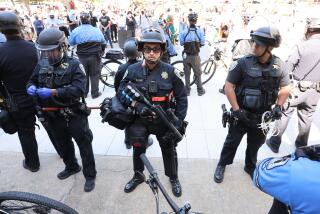Riots Put Official Back in His Job
- Share via
BAIJI, Iraq — Seeking to quell violent rioting in this northern oil-refining city, U.S. authorities on Monday removed an unpopular police chief they had installed five months earlier and reinstated his predecessor.
The rehired police chief was originally chosen for the job by local tribal leaders, who have great prestige and influence in Sunni Muslim towns in the north and west of Iraq.
Support for Saddam Hussein also runs high in Baiji, about 125 miles northwest of Baghdad and only a short distance from the deposed leader’s hometown, Tikrit.
The three days of unrest in Baiji showed how challenges to the traditional tribal power structure, coupled with continuing loyalty to Hussein, can spark violence against U.S. forces and any who are seen as their allies.
The fighting in Baiji was mainly between demonstrators and Iraqi police, but the Americans intervened after rioters rocketed the mayor’s office, blew up a fuel truck and attacked the local police headquarters.
On Monday night, U.S. Bradley fighting vehicles rumbled through the town’s darkened streets amid the crackle of gunfire; during the day, American troops had taken up sniper positions on several rooftops.
Witnesses said the trouble began Saturday at a protest against the American military presence and the U.S.-installed police chief, Ismail Jaburi, which started peacefully but soon flared into a confrontation.
“People are against the Iraqi police because they are supporting the behavior of the Americans, who are detaining us and raiding our houses,” said Ahmed Sharif, 26, who took part in the demonstrations.
In Tikrit and surrounding communities, U.S. troops are conducting frequent nighttime raids, breaking down doors before dawn to search for top Hussein associates, weapons caches and bomb-making materials.
Police and armed protesters clashed again Sunday in Baiji, exchanging rifle fire. As the confrontation escalated, Mayor Hamid Rajab was forced to flee his office when the rioters fired rocket-propelled grenades into it, setting it ablaze.
Afterward, the demonstrators put portraits of the ousted Iraqi leader amid the wreckage and painted slogans on the walls reading “Yes, yes to Saddam Hussein, and no, no to Bush!”
Even before the dispute over the police chief, the town of about 55,000 people had been simmering with anger. Unemployment is extremely high, former Iraqi army soldiers are demanding back pay, and locals suspect that Turkish smugglers are getting a windfall from cheap fuel procured in Baiji, home to Iraq’s largest oil refinery.
By late Monday, the mood in the streets was still volatile, with crowds of young men milling at the entrance to the town and warning strangers to leave before dark.
But the mayor said tribal leaders were satisfied with the decision to reappoint as police chief Hamid Qaisi, who was removed in May by U.S. military authorities, who wanted to put in a chief of their choosing.
Maj. Josslyn Aberle, a spokeswoman for the U.S. Army’s 4th Infantry Division, which controls the area, said the American-installed chief was removed by the provincial government after consultation with coalition forces. She said the action was based on the chief’s performance but did not elaborate.
Two Iraqis were hurt in the unrest and six detained, according to Aberle.
She said during the worst of the violence, U.S. troops provided a security cordon around the town, shutting down the country’s main north-south highway.
King reported from Baiji and Marshall from Baghdad.
More to Read
Sign up for Essential California
The most important California stories and recommendations in your inbox every morning.
You may occasionally receive promotional content from the Los Angeles Times.













